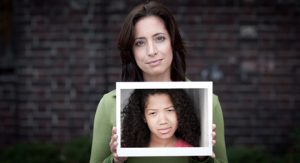The year was 1826. What did the United States look like then? Recently, I discovered, hanging on a wall in a venerable financial institution, an old map of our country dated 1826. What a difference, then and now. Most of the land west of the Mississippi River was Mexico: that included California, Nevada, New Mexico, Texas, Utah, Arizona and western Colorado. Isn’t it ironic that we build walls to keep out people whose country this was originally?
Which brings me to the topic: fear of others. Xenophobia is the word used to describe such fear, xeno being the Greek word meaning strange or other. “Stranger danger” is the motto of the xenophobe.
More irony. Xenophobia allows for an us/them mentality to pervade a society. “We’re good, they’re bad.” Hence, Hungary purports itself to be protective of its borders in the face of migrations from war-torn countries, especially Syria. Xenophobes suffer great memory loss, forgetting how they were refugees once. Hungarians fled during and after World War II and were aided by other nations. I remember the Hungarian revolution of 1956 also, when families fled to the U.S. in fact, one such family was given a home on the dairy farm of a Hungarian American family in my hometown. Their children became my classmates.
However, the Hungarian right-wing government (the citizens themselves have displayed great compassion) is only one example of xenophobia. We all carry a kernel of xenophobia within when we project badness onto others and feel self-righteous about ourselves. Of course, we need healthy personal boundaries. Of course, nations have boundaries. Yet, on both the personal and collective level, boundaries, to be healthy, need to be semi-permeable rather than rigid and inflexible.
Flexibility allows us to be accepting of the differences among us. Rather than setting us apart such diversity makes life more creative and colorful for everyone.
Reading about other cultures and traveling to foreign places can help us see that underneath the difference, there is a universality to our humanity. We all want a safe place to work, to raise our families.
Pope Francis is in the U.S. this week. Certainly, his message fosters this sense of care, not for the “other” but for those of “us” who are in need.
Actually, hospitality of the stranger is a theme throughout history. The poet David Whyte reminds us, “what is new, what is good, is provided by strangers.” So rather than “stranger danger,” we can welcome the stranger to expand our consciousness and our world! Besides, who of us does not have a history of immigration? Even the Native Americans do.
Donations for the refugee crisis can be made to:
• UN Refugee Agency (www.unhcr.org)
• MercyCorps (www.mercycorps.org)
• International Rescue Committee (www.rescue.org)
* Kayta Curzie Gajdos holds a doctorate in counseling psychology and is in private practice in Chadds Ford, Pennsylvania. She welcomes comments at MindMatters@DrGajdos.com or 610-388-2888. Past columns are posted to www.drgajdos.com. See book.quietwisdom-loudtimes.com for information about her book, “Quiet Wisdom in Loud Times: The Rise of the Wounded Feminine.”
The opinions expressed are those of the author and do not necessarily reflect those of the ownership or management of Chadds Ford Live. We welcome opposing viewpoints. Readers may comment in the comments section or they may submit a Letter to the Editor to: editor@chaddsfordlive.com
About Kayta Gajdos
Dr. Kathleen Curzie Gajdos ("Kayta") is a licensed psychologist (Pennsylvania and Delaware) who has worked with individuals, couples, and families with a spectrum of problems. She has experience and training in the fields of alcohol and drug addictions, hypnosis, family therapy, Jungian theory, Gestalt therapy, EMDR, and bereavement. Dr. Gajdos developed a private practice in the Pittsburgh area, and was affiliated with the Family Therapy Institute of Western Psychiatric Institute and Clinic, having written numerous articles for the Family Therapy Newsletter there. She has published in the American Psychological Association Bulletin, the Family Psychologist, and in the Swedenborgian publications, Chrysalis and The Messenger. Dr. Gajdos has taught at the college level, most recently for West Chester University and Wilmington College, and has served as field faculty for Vermont College of Norwich University the Union Institute's Center for Distance Learning, Cincinnati, Ohio. She has also served as consulting psychologist to the Irene Stacy Community MH/MR Center in Western Pennsylvania where she supervised psychologists in training. Currently active in disaster relief, Dr. Gajdos serves with the American Red Cross and participated in Hurricane Katrina relief efforts as a member of teams from the Department of Health and Human Services' Substance Abuse and Mental Health Services Administration.Now living in Chadds Ford, in the Brandywine Valley of eastern Pennsylvania, Dr. Gajdos combines her private practice working with individuals, couples and families, with leading workshops on such topics as grief and healing, the impact of multigenerational grief and trauma shame, the shadow and self, Women Who Run with the Wolves, motherless daughters, and mediation and relaxation. Each year at Temenos Retreat Center in West Chester, PA she leads a griefs of birthing ritual for those who have suffered losses of procreation (abortions, miscarriages, infertility, etc.); she also holds yearly A Day of Re-Collection at Temenos.Dr. Gajdos holds Master's degrees in both philosophy and clinical psychology and received her Ph.D. in counseling at the University of Pittsburgh. Among her professional affiliations, she includes having been a founding member and board member of the C.G. Jung Educational Center of Pittsburgh, as well as being listed in Who's Who of American Women. Currently, she is a member of the American Psychological Association, The Pennsylvania Psychological Association, the Delaware Psychological Association, the American Family Therapy Academy, The Association for Death Education and Counseling, and the Delaware County Mental Health and Mental Retardation Board. Woven into her professional career are Dr. Gajdos' pursuits of dancing, singing, and writing poetry.
- Web |
- More Posts(250)




Comments